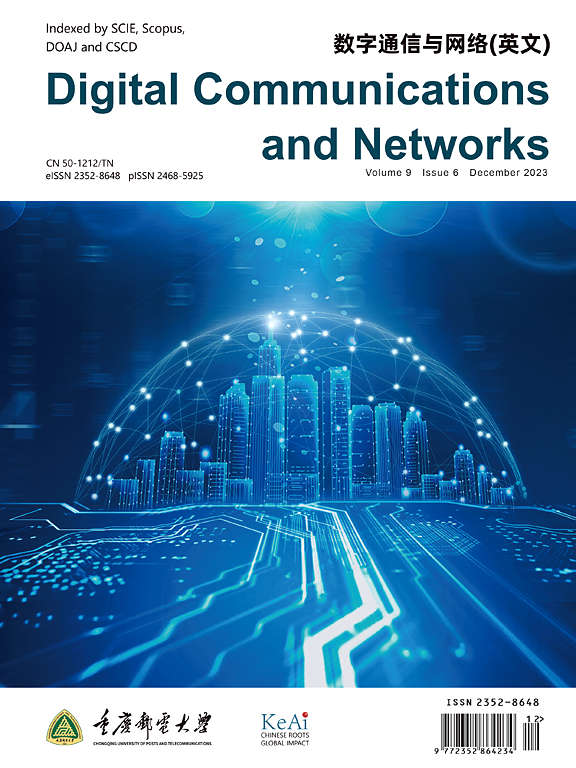基于强化学习的物联网计算任务卸载群智能方法
IF 7.5
2区 计算机科学
Q1 TELECOMMUNICATIONS
引用次数: 0
摘要
区块链技术基于去中心化数据存储和分布式共识设计,具有防篡改和不可否认的特性,已成为解决物联网数据安全风险和提供隐私保护的一种很有前景的解决方案。虽然区块链通常不需要第三方信任组织的认可,但它大多需要进行必要的数学计算来防止恶意攻击,这对参与设备的计算资源要求更严格。通过将支持区块链共识所需的计算任务卸载到边缘服务节点或云端,同时为物联网应用提供数据隐私保护,可以有效解决物联网设备计算和能源的限制。然而,如何为物联网设备做出合理的卸载决策仍然是一个悬而未决的问题。由于强化学习(RL)具有出色的自学习能力,本文提出了一种基于RL的群体智能优化算法(RLSIOA),旨在提高初始解的质量,实现计算任务卸载决策的高效优化。该算法考虑了可能影响物联网设备执行共识算法获得收益的各种因素(如工作量证明),优化了要卸载的子任务比例和从边缘和云端租用的计算资源规模,使设备收益最大化。实验结果表明,与具有代表性的基准算法相比,RLSIOA能够以更低的延迟成本获得更高质量的卸载决策方案。本文章由计算机程序翻译,如有差异,请以英文原文为准。
Reinforcement learning-enabled swarm intelligence method for computation task offloading in Internet-of-Things blockchain
Blockchain technology, based on decentralized data storage and distributed consensus design, has become a promising solution to address data security risks and provide privacy protection in the Internet-of-Things (IoT) due to its tamper-proof and non-repudiation features. Although blockchain typically does not require the endorsement of third-party trust organizations, it mostly needs to perform necessary mathematical calculations to prevent malicious attacks, which results in stricter requirements for computation resources on the participating devices. By offloading the computation tasks required to support blockchain consensus to edge service nodes or the cloud, while providing data privacy protection for IoT applications, it can effectively address the limitations of computation and energy resources in IoT devices. However, how to make reasonable offloading decisions for IoT devices remains an open issue. Due to the excellent self-learning ability of Reinforcement Learning (RL), this paper proposes a RL enabled Swarm Intelligence Optimization Algorithm (RLSIOA) that aims to improve the quality of initial solutions and achieve efficient optimization of computation task offloading decisions. The algorithm considers various factors that may affect the revenue obtained by IoT devices executing consensus algorithms (e.g., Proof-of-Work), it optimizes the proportion of sub-tasks to be offloaded and the scale of computing resources to be rented from the edge and cloud to maximize the revenue of devices. Experimental results show that RLSIOA can obtain higher-quality offloading decision-making schemes at lower latency costs compared to representative benchmark algorithms.
求助全文
通过发布文献求助,成功后即可免费获取论文全文。
去求助
来源期刊

Digital Communications and Networks
Computer Science-Hardware and Architecture
CiteScore
12.80
自引率
5.10%
发文量
915
审稿时长
30 weeks
期刊介绍:
Digital Communications and Networks is a prestigious journal that emphasizes on communication systems and networks. We publish only top-notch original articles and authoritative reviews, which undergo rigorous peer-review. We are proud to announce that all our articles are fully Open Access and can be accessed on ScienceDirect. Our journal is recognized and indexed by eminent databases such as the Science Citation Index Expanded (SCIE) and Scopus.
In addition to regular articles, we may also consider exceptional conference papers that have been significantly expanded. Furthermore, we periodically release special issues that focus on specific aspects of the field.
In conclusion, Digital Communications and Networks is a leading journal that guarantees exceptional quality and accessibility for researchers and scholars in the field of communication systems and networks.
 求助内容:
求助内容: 应助结果提醒方式:
应助结果提醒方式:


